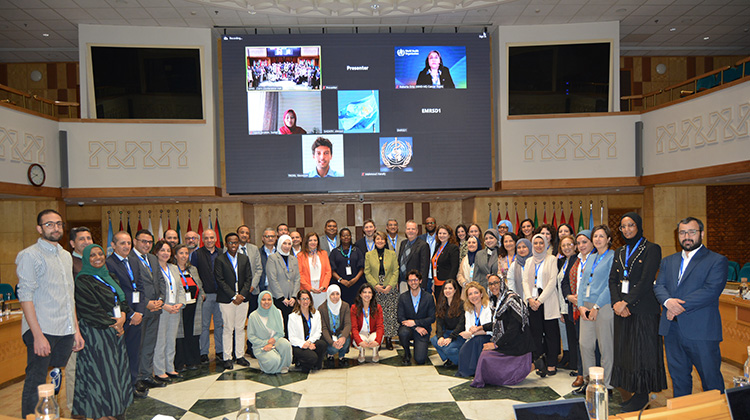
11 March 2024 – Globally, more than 400 000 children and adolescents aged 0–19 years are diagnosed with cancer every year. Latest Global Cancer Observatory estimates for the WHO Eastern Mediterranean Region show that there were about 36 000 new cases of paediatric cancers and 16 500 deaths in 2022.
Experts from every country and territory of the Region, international partners, and WHO colleagues from headquarters and various regional offices came together last week to accelerate action to fight childhood cancer. The occasion was a 2-day workshop on “Empowering progress: strengthening implementation of the WHO Global Initiative for Childhood Cancer in the Eastern Mediterranean Region”.
It is 5 years since WHO launched the Global Initiative for Childhood Cancer (GICC), with the technical and financial support of St Jude Children’s Research Hospital, Memphis, Tennessee, USA. The workshop chiefly aimed to take stock of lessons learned, enrich understanding, and combine efforts to prioritize childhood cancer across the Region. By implementing the GICC, countries and territories can substantially contribute to achieving the Sustainable Development Goal target 3.4, to reduce premature mortality from noncommunicable diseases by one third by 2030.
Childhood cancer is adding to the growing disease burden among children worldwide, and actual numbers of cases and deaths are significantly higher than estimates. Unlike cancer in adulthood, the factors that contribute to childhood cancer are poorly understood, and only a small fraction of childhood cancers can be prevented.
Seven focus countries and territories in the Region have joined the GICC so far: Egypt, Jordan, Lebanon, Morocco, the occupied Palestinian territory, Pakistan and Syria. Focus countries are those that have committed to scale up interventions to increase the overall survival rate of children with cancer, in line with the WHO CureAll technical package. WHO and health ministry representatives from the 7 focus countries/territories, as well as Iraq and Oman, shared their experiences with participants, and encouraged others to join the GICC.
Participants discussed obstacles to childhood cancer control in the Eastern Mediterranean Region. At least half of the countries and territories are affected by the impacts of conflicts, natural disasters, political instability and economic crises. Childhood cancer is still seen as a niche health issue, given its relatively low incidence compared to other cancers or diseases. Also, cancer in general is seen as a daunting public health problem, given the relatively high investment needed to initiate and sustain relevant programmes.
To overcome these challenges, WHO works with partners and stakeholders to strengthen national health systems for better childhood cancer care and to ensure long-term sustainability of national childhood cancer programmes, through effective and extensive resource mobilization.
The goal of the GICC is to achieve an overall survival rate of at least 60% for children with cancer – an ambitious goal, especially in the Eastern Mediterranean Region, where health systems are strained. It is crucial to enhance health systems to progress towards meeting this goal and to ensure that no child is left behind.
Achieving this goal is possible, however, as shown by examples of national-level interventions shared at the workshop. The GICC collaboration and the significant impact of WHO’s partnerships with Childhood Cancer International, the Pediatric Oncology East and Mediterranean Group, and the International Society of Pediatric Oncology show the power of collective effort and shared expertise in advancing the cause of childhood cancer care. Even amid the ongoing war in the occupied Palestinian territory, WHO and partners have managed to procure vital paediatric oncology medications and support the evacuation of children with cancer and their families from the Gaza Strip to Egypt and Jordan.
Participants also talked about next steps for the GICC, including the launch of the Global Platform for Access to Childhood Cancer Medications. This innovation will help ensure that all children who need essential cancer medications can access them, irrespective of their country of birth.


